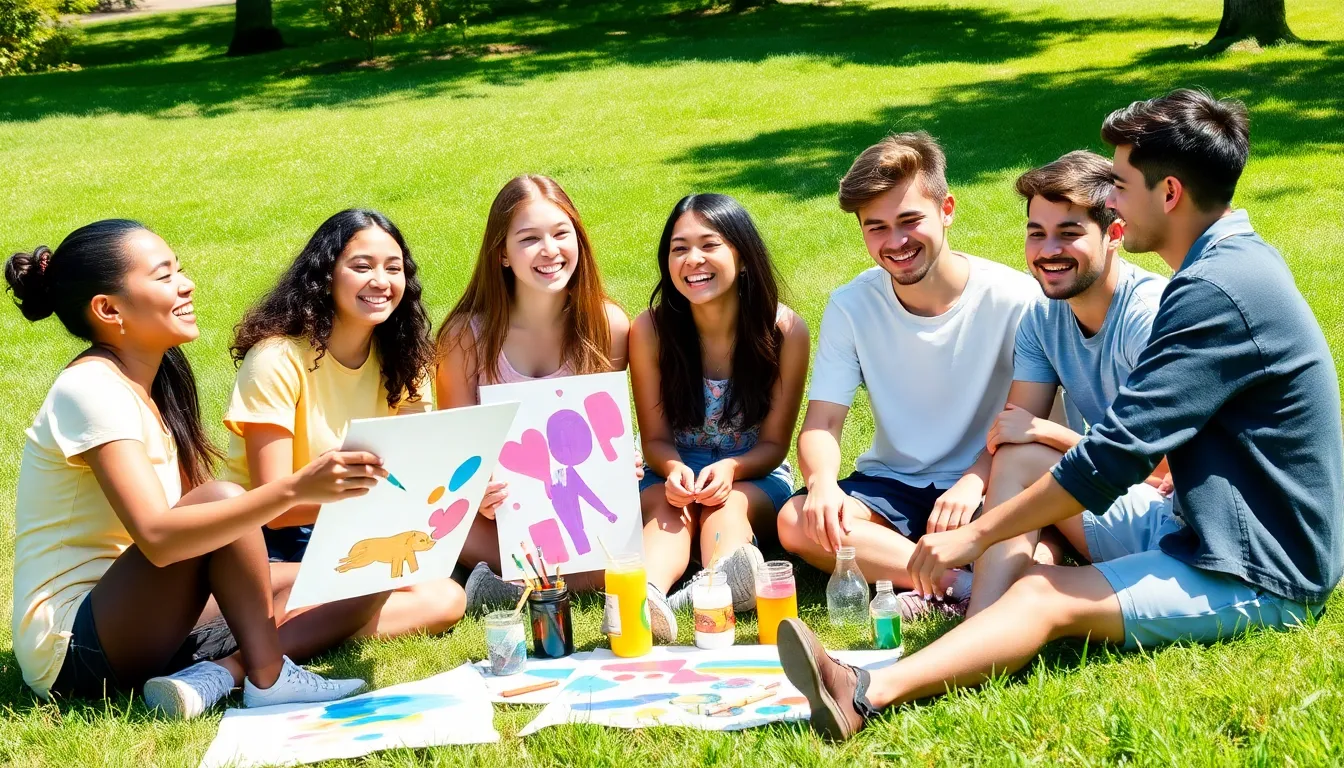Navigating the teenage years can feel like trying to solve a Rubik’s Cube blindfolded—confusing and frustrating. With academic pressures social media drama and the quest for identity, it’s no wonder mental health often takes a backseat. But fear not! Engaging in fun and effective mental health activities can transform those turbulent times into opportunities for growth and connection.
Table of Contents
ToggleUnderstanding Mental Health in Teens
Mental health plays a critical role in the overall well-being of teenagers. Adolescents face unique challenges that can impact their emotional health, including academic pressures, social media influence, and identity exploration. Factors such as these often contribute to anxiety, depression, and stress in this age group.
Statistics reveal that approximately 1 in 5 teens experience some form of mental health disorder. Early intervention proves essential to prevent long-term consequences. When mental health issues go unrecognized, they can affect self-esteem, relationships, and academic performance.
Engagement in mental health activities fosters resilience among teenagers. Examples include mindfulness practices such as meditation and yoga, which help reduce anxiety and promote relaxation. Creative outlets like art and music also serve as effective stress relievers, allowing teens to express emotions in a constructive manner.
Peer support groups offer another beneficial activity. These environments provide safe spaces for sharing experiences and connecting with others facing similar challenges. Healthy relationships are vital as they can enhance emotional support and foster a sense of belonging.
Educators and parents play key roles in promoting mental health awareness among teenagers. Open discussions about emotions and mental health can destigmatize these issues, encouraging teens to seek help when necessary. Prioritizing mental health empowers adolescents to navigate their complex lives more effectively.
Understanding the importance of mental health during adolescence is crucial for the development of healthy, well-adjusted adults. Fostering resilience through targeted activities equips teens with the skills necessary to manage life’s challenges successfully.
Importance of Mental Health Activities for Teens

Mental health activities play a vital role in the lives of teenagers. Engaging in structured activities helps address the mental health challenges that many young people face today.
Benefits of Engaging in Activities
Participating in mental health activities boosts self-esteem and provides an escape from daily pressures. These activities enhance emotional regulation, allowing teens to manage anxiety and stress effectively. Opportunities for creativity, such as art and music, improve mood and develop coping strategies. Connection with peers through group activities fosters a sense of belonging. Teens learn to communicate openly, leading to stronger relationships and support networks.
How Activities Promote Well-Being
Activities focused on mental health provide a foundation for overall well-being. Mindfulness practices enhance focus and reduce symptoms of anxiety, while physical exercise releases endorphins that elevate mood. Exploring hobbies encourages self-discovery and personal growth. Engaging with supportive communities creates a safe environment for sharing experiences. Establishing healthy routines promotes stability, helping teens navigate emotional challenges with resilience. Prioritizing these activities can lead to a healthier, more balanced lifestyle.
Popular Mental Health Activities for Teens
Engaging in mental health activities can significantly enhance a teen’s emotional well-being. Understanding these popular options can provide effective support during this formative time.
Creative Expression Through Art
Creative expression through art serves as an excellent outlet for teenagers. Painting, drawing, or crafting allows them to process emotions visually. Art therapy has shown to reduce symptoms of anxiety and depression. Engaging in these activities encourages self-exploration and boosts confidence. Group art projects also promote teamwork and help establish peer connections. Workshops focused on various mediums can provide further opportunities for growth.
Physical Activities and Sports
Physical activities and sports play a vital role in promoting mental health. Regular exercise releases endorphins, which alleviate stress and improve mood. Team sports foster camaraderie and teach valuable communication skills. Individual activities, like running or yoga, offer personal reflection and mindfulness. Many community centers and schools provide programs tailored for teens, creating structured environments for participation. These activities build resilience and contribute to a sense of achievement.
Mindfulness and Meditation Techniques
Mindfulness and meditation techniques offer teens tools for emotional regulation. Practices such as deep breathing, progressive muscle relaxation, and guided imagery help in stress management. Setting aside time for mindfulness supports better focus and enhances overall emotional health. Many resources, including mobile apps and online courses, are accessible for guided practices. Students often benefit from school programs that incorporate mindfulness training. Participation can empower them to handle daily pressures more effectively.
Implementing Activities in Daily Life
Engaging in mental health activities during daily life enhances the well-being of teenagers significantly. Incorporating these practices creates routines that cultivate resilience and emotional balance.
Suggestions for Parents and Educators
Support from parents and educators is vital in promoting mental health activities. Encouragement to participate in art therapy or mindfulness practices fosters self-expression and emotional connection. Parents can set aside time each week for family activities centered on mental well-being. Educators might consider integrating mindfulness sessions into the school curriculum. Open conversations about mental health can dissolve stigma and create a safe atmosphere for sharing. Educators can also provide resources, including mobile apps or local workshops, to further support teens’ mental health needs.
Creating a Supportive Environment
A supportive environment plays a crucial role in mental health. Establishing routines offers stability, as predictable schedules help teens feel secure. Spaces designated for creativity, such as art corners or quiet zones, promote self-expression. Peer groups should emphasize positive interactions, fostering healthy relationships among teens. Age-appropriate resources can aid in discussions about mental health, reinforcing understanding and empathy. Everyone involved must validate feelings and encourage resilience, ensuring teens know they are not alone in their experiences.
Mental health activities for teens are essential in navigating the complexities of adolescence. Engaging in these activities not only fosters resilience but also creates a supportive environment where young people can thrive. By encouraging creativity mindfulness and physical activity teens can develop coping strategies that enhance their emotional well-being.
Parents educators and peers play a vital role in promoting these activities. Open discussions about mental health help to break down stigma and encourage a culture of support. As teens explore their identities and face various pressures integrating mental health practices into their daily lives can lead to healthier outcomes.
Establishing routines that prioritize mental health sets the stage for lifelong well-being. With the right tools and support teens can emerge from these formative years as confident individuals ready to tackle life’s challenges.




